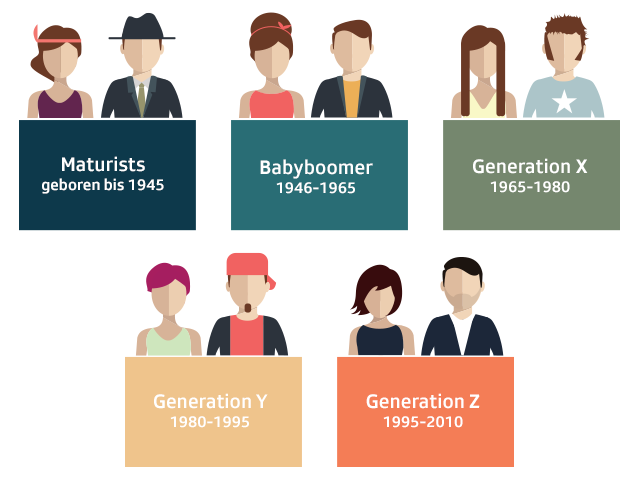How young Swiss differ from older generations

There are five generations living in Switzerland: the Traditionals, the Baby Boomers, X, Y and Z. We’ve come up with ten major differences between young and old Swiss.

Young people dream of owning a nice car, right? Maybe in the old days – but it’s no longer an important goal for young Swiss people. Fewer and fewer even know how to drive.
This probably isn’t just a generational thing; there are also practical reasons. In Switzerland it is extremely expensive and time-consuming to get a driving licence. At the same time, public transport options have expanded to include night buses on weekends, while parking spaces are becoming increasingly expensive, especially in cities. Owning a car in Switzerland is simply no longer as attractive as it used to be – or as it is in other countries.

More
Driving licence loses attraction for young Swiss
Car-Sharing, Uber, Airbnb, communal living: The sharing economy seems hip, especially for generations Y and Z. But according to a recent commentary in the Zurich-based newspaper Neue Zürcher Zeitung, millennials aren’t abandoning consumption and status symbols for ecological and social reasons; they’re just short of cash. This is presumably no different for Generation Z.

Referendums in Switzerland provide good examples of different generational values. Young and old often disagree, especially when it comes to votes on the army and foreign policy as well as socio-political issues. For example, according to the Vox analysis, nearly 60% of 18-to-29-year-olds rejected the mass immigration initiative; they therefore did not want any restrictions on immigration.
Since the 1960s, home ownership has become very popular in Switzerland. Nevertheless, the ownership rate in Switzerland remains low by international standards as the Swiss are a nation of tenants.
According to the Credit Suisse study “Swiss Real Estate Market 2017”, young people often live alone in rental apartments. But in the longer term, they also dream of their own four walls. In a survey of Switzerland’s Generation Y, 70% of participants gave high priority to home ownership.
As for Generation Z, 84% want homes of their own – compared with 90% in the US, 92% in Singapore and 94% in Brazil – found the 2018 Credit Suisse Youth Barometer. Whether they will be able to afford them in the face of rising real estate prices and stagnating wages is another matter.

More
How long does it take to buy a Swiss home?
While older people know how to get the most out of their food, the younger ones are more wasteful.

More
Too much food going to waste
This is astonishing, considering that generations Y and Z are actually considered ecological.
Also in Switzerland, pupils have been taking to the streets for climate protection. Called “Greta’s Generation” because of Swedish climate activist Greta Thunberg, Generation Z is shaking up politics across Europe with its student strike. Also for Generation Y, climate change and global warming are among the greatest concerns in Western countries.

More
Can Greta’s generation make a mark on Swiss politics?
According to a study from the University of Constance, Swiss Baby Boomers are much more satisfied with their work than generations X and Y. Members of Generation Y are less loyal to their employers than older generations, but as the study found, they’re also the most willing to work – closely followed by Generation X. The Baby Boomers exhibit significantly less willingness to work.
In contrast to older generations, young people have little confidence that the state will provide for them in old age. Many also believe that current pensioners have it better. In fact, one in five members of Generation Y believe that retirement provisions should be privatised.
Young Swiss people are more concerned about their pensions than young people in other countries. And rightly so. Although the Swiss pension system is very generous, it is not very sustainable.

More
As Switzerland ages, the pension system gets stretched
About 93% of childless women and men aged 20-29 want kids. This is more than the number of older people who actually have children. Around seven out of ten women (70%) and almost two thirds of men (64%) aged 25 to 80 are parents.
But the desire to have children has hardly changed over the generations. In the 1990s, only 6.1% of women and 8.9% of men between the ages of 20 and 29 did not want children. So when it comes to wanting children, it’s not a generational gap but rather desire versus reality.
Today’s young live with their parents longer than previous generations did. This has to do not only with longer periods of study and financial hardship, but also with comfort, according to a survey by Comparis. Adult offspring appreciate their parents’ laundry, cleaning and cooking services. In addition, the young generation has hardly any conflicts with their parents, so there is no reason to move out.

Contact the author @SibillaBondolfi on FacebookExternal link or TwitterExternal link.
Adapted from German by Susan Misicka

In compliance with the JTI standards
More: SWI swissinfo.ch certified by the Journalism Trust Initiative





You can find an overview of ongoing debates with our journalists here. Please join us!
If you want to start a conversation about a topic raised in this article or want to report factual errors, email us at english@swissinfo.ch.